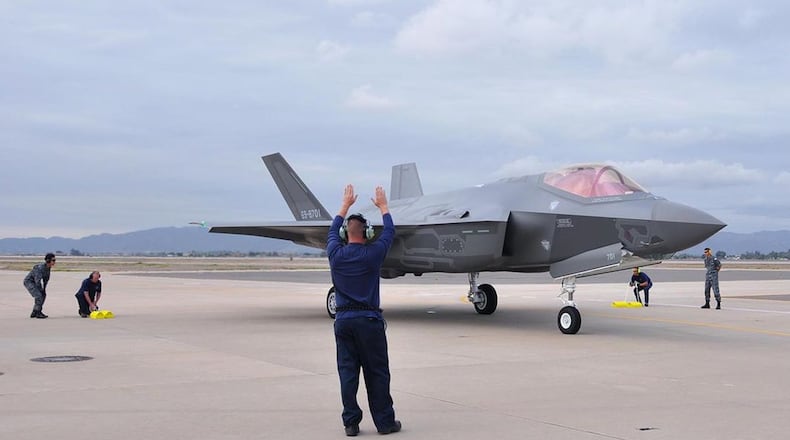“I guarantee you, you’ll see a lot of announcements coming up in this year,” said the one-star general and former Air Force military fellow to the Council on Foreign Relations.
Foreign military sales can range from 50 F-35 fighters to a simple flight suit or construction of a far-off airfield, Bruckbauer said.
Whatever the job is, he said the directorate strives to keep relations with allies and partners strong — and where possible, the domestic industrial base healthy.
That’s crucial in this era of rival power competition, when attracting new partners and maintaining current alliances is integral to ongoing security.
Last year, the Pentagon’s 2020 assessment of U.S. industrial capabilities expressed concern about how deindustrialization in the U.S. could weaken the defense supply chain. In part, the report called for a restoration of the nation’s “defense industrial base and supply chains.”
“That’s probably one of the best things to be able to convey to the workforce here, just how important their job is,” Bruckbauer said. “You know, not every (mission) can look at the national defense strategy and say, ‘Look, your work, each and every day, is directly linked to one of the pillars of the national defense strategy.’”
“We are helping them with their security needs,” he said of the 116 nations with which the directorate works. “But at the same time, we’re also attracting new partners or maintaining a current partner or advancing a common goal.”
Today, the directorate has 3,274 foreign military sales cases, valued at a total that exceeds $224 billion.
When Bruckbauer took command nearly two years ago, that number stood at $181 billion.
“It’s been a pretty even and incremental growth,” he said.
Among notable recent sales: At the end of 2020, the directorate concluded a 10-year stretch of developing and managing the logistics for the largest Air Force foreign military sale case in its history, with Saudi Arabia.
The Air Force Life Cycle Management Center, also based at Wright-Patterson, announced the final aircraft delivery for the $29 billion agreement in December 2020. As part of that, a final F-15SA fighter aircraft was delivered to the Royal Saudi Air Force, the center said at that time.
There will be other deals to rival that, Bruckbauer predicted.
A sale to the United Arab Emirates of MQ-9 drones, F-35s and assorted munitions will be quite large, as will Qatar’s purchase of advanced F-15s, he said.
“Those two cases … are going to be pretty large as well,” said Bruckbauer, who is also dual-hatted as director of the Air Force Materiel Command’s International Affairs Directorate. “Big team effort, for sure.”
The directorate has more than 700 people directly assigned to it, with most of them located at Wright-Patterson. The mission also has support offices across the country at Tinker, Hill and other Air Force bases.
“We found that having those out offices is important,” the commander said. “Because the FMS (foreign military sales) enterprise is fairly large. I think at Air Force Materiel Command, we count around 3,100 folks … who are within the foreign military sales enterprise, if you will.”
“A lot of people every day are thinking and doing FMS,” he added.
The directorate has seen perhaps a 4% to 5% increase in its FMS workforce nationwide in recent years.
“If the workload continues to increase, there will be a corresponding increase in people who we bring in to the foreign military sales enterprise,” Bruckbauer said.
The commander said he has been pleased that his workforce was able to weather the pandemic and continue their mission unimpeded, even remotely. At first, he wasn’t certain that would be case, with many partners and allies preferring face-to-face consultations.
“There’s nothing that’s gotten in our way of being able to support our partners,” he said.
In all, AFSAC oversees a portfolio of more than 6,700 aircraft and other weapon systems, equipment, supply and construction jobs.
Mark Cancian, senior advisor for the international security program at the Center for Strategic and International Studies in Washington DC., believes there will be a “major policy change” on military sales with the administration of President Joe Biden.
“The Trump administration regarded arms sales through the lens of employment and support for manufacturing,” Cancian said. “The Biden administration will put a particular emphasis on human rights.”
About the Author


